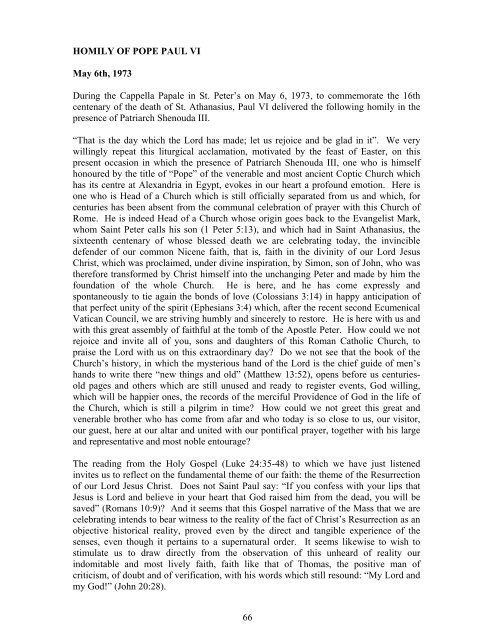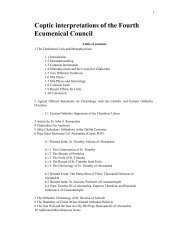Coptic Church & Ecumenical Movement - Saint Mina Coptic ...
Coptic Church & Ecumenical Movement - Saint Mina Coptic ...
Coptic Church & Ecumenical Movement - Saint Mina Coptic ...
Create successful ePaper yourself
Turn your PDF publications into a flip-book with our unique Google optimized e-Paper software.
HOMILY OF POPE PAUL VI<br />
May 6th, 1973<br />
During the Cappella Papale in St. Peter’s on May 6, 1973, to commemorate the 16th<br />
centenary of the death of St. Athanasius, Paul VI delivered the following homily in the<br />
presence of Patriarch Shenouda III.<br />
“That is the day which the Lord has made; let us rejoice and be glad in it”. We very<br />
willingly repeat this liturgical acclamation, motivated by the feast of Easter, on this<br />
present occasion in which the presence of Patriarch Shenouda III, one who is himself<br />
honoured by the title of “Pope” of the venerable and most ancient <strong>Coptic</strong> <strong>Church</strong> which<br />
has its centre at Alexandria in Egypt, evokes in our heart a profound emotion. Here is<br />
one who is Head of a <strong>Church</strong> which is still officially separated from us and which, for<br />
centuries has been absent from the communal celebration of prayer with this <strong>Church</strong> of<br />
Rome. He is indeed Head of a <strong>Church</strong> whose origin goes back to the Evangelist Mark,<br />
whom <strong>Saint</strong> Peter calls his son (1 Peter 5:13), and which had in <strong>Saint</strong> Athanasius, the<br />
sixteenth centenary of whose blessed death we are celebrating today, the invincible<br />
defender of our common Nicene faith, that is, faith in the divinity of our Lord Jesus<br />
Christ, which was proclaimed, under divine inspiration, by Simon, son of John, who was<br />
therefore transformed by Christ himself into the unchanging Peter and made by him the<br />
foundation of the whole <strong>Church</strong>. He is here, and he has come expressly and<br />
spontaneously to tie again the bonds of love (Colossians 3:14) in happy anticipation of<br />
that perfect unity of the spirit (Ephesians 3:4) which, after the recent second <strong>Ecumenical</strong><br />
Vatican Council, we are striving humbly and sincerely to restore. He is here with us and<br />
with this great assembly of faithful at the tomb of the Apostle Peter. How could we not<br />
rejoice and invite all of you, sons and daughters of this Roman Catholic <strong>Church</strong>, to<br />
praise the Lord with us on this extraordinary day? Do we not see that the book of the<br />
<strong>Church</strong>’s history, in which the mysterious hand of the Lord is the chief guide of men’s<br />
hands to write there “new things and old” (Matthew 13:52), opens before us centuriesold<br />
pages and others which are still unused and ready to register events, God willing,<br />
which will be happier ones, the records of the merciful Providence of God in the life of<br />
the <strong>Church</strong>, which is still a pilgrim in time? How could we not greet this great and<br />
venerable brother who has come from afar and who today is so close to us, our visitor,<br />
our guest, here at our altar and united with our pontifical prayer, together with his large<br />
and representative and most noble entourage?<br />
The reading from the Holy Gospel (Luke 24:35-48) to which we have just listened<br />
invites us to reflect on the fundamental theme of our faith: the theme of the Resurrection<br />
of our Lord Jesus Christ. Does not <strong>Saint</strong> Paul say: “If you confess with your lips that<br />
Jesus is Lord and believe in your heart that God raised him from the dead, you will be<br />
saved” (Romans 10:9)? And it seems that this Gospel narrative of the Mass that we are<br />
celebrating intends to bear witness to the reality of the fact of Christ’s Resurrection as an<br />
objective historical reality, proved even by the direct and tangible experience of the<br />
senses, even though it pertains to a supernatural order. It seems likewise to wish to<br />
stimulate us to draw directly from the observation of this unheard of reality our<br />
indomitable and most lively faith, faith like that of Thomas, the positive man of<br />
criticism, of doubt and of verification, with his words which still resound: “My Lord and<br />
my God!” (John 20:28).<br />
66








